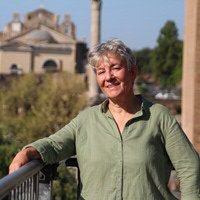Alumna in Italië: Andrea Vreede
Het is nog maar anderhalf jaar geleden dat de hele wereld ze zag: de beelden van legertrucks die af en aan reden om lichamen te bergen in Lombardije. Italië werd in het begin van de coronapandemie ongekend hard getroffen. Sindsdien liet het land zich van een verrassende kant zien, zegt Andrea Vreede (59), Vaticaanwatcher voor de NOS en Italië-correspondent voor de Belgische VRT. Ze studeerde Klassieke Talen en Mediterrane Archeologie en woont in Rome sinds 1994.
Tekst Dorien Vrieling; Foto Heleen D’Haens

‘Ik had verwacht dat het een enorme zooi zou worden, maar het tegenovergestelde is gebeurd. De regering heeft ervoor gekozen de ernst van de situatie volledig te erkennen. Men heeft gedacht: dit is zo’n groot en onbekend monster, we kunnen dit niet aan de burger overlaten. En die burger, die heeft zich daarin volgzaam opgesteld. Er is een bijzondere vorm van maatschappelijke solidariteit ontstaan als reactie op de klappen die men heeft gehad van het virus. Niet zo gek: er zijn zoveel opa’s en oma’s die overleden aan corona of in ieder geval groot risico liepen. Dat wordt niet vergeten.’
Bij het ontstaan van die solidariteit heeft het katholiek geloof een grote rol gespeeld, zegt Vreede. Ze memoreert hoe paus Franciscus – die centraal staat in de Pauscast, de podcast over het Vaticaan die ze samen met Wilfred Kemp en RUG-alumna Sara Plat voor KRO-NCRV maakt – eind maart vorig jaar in de stromende regen een gebed uitsprak op het Sint Pietersplein. ‘Bijna iedere Italiaan voelt zoiets, het was balsem voor de natie. Nederlanders zijn soms geneigd daar wat lacherig over te doen, ons land is zo geseculariseerd, maar Italië is een door en door katholiek land, waar religie sterk bijdraagt aan een gevoel van saamhorigheid. Bij rites de passage – geboorte, huwelijk, sterven – speelt de kerk een enorme rol.’
Iets anders wat je bij zulke grote gebeurtenissen niet kunt wegdenken: eten. Er is weinig belangrijker in het leven van een Italiaan, zegt Vreede. ‘En dan vooral sámen eten. Daar is zelfs een woord voor: convivialità.’ Toen ze voor een ingreep in het ziekenhuis moest zijn, kalmeerde het gesprek in de operatiekamer haar minstens zozeer als het roesje dat haar was toegediend. ‘Ik hoorde de anesthesist en de chirurg binnenkomen, ze wasten hun handen. Vervolgens ontstond er een gesprek over wat ze die zondag met hun families gegeten hadden, hoe je die gerechten kunt maken, en zelfs over hoe ze het eten verteerd hadden - ook niet onbelangrijk. Heerlijk om naar te luisteren, ik had ineens alle vertrouwen in de operatie.’
De liefde voor samen tafelen is een uiting van de Italiaanse eigenschap die Vreede misschien wel het meest inspireert: het vermogen om te genieten van kleine dingen. ‘In de coronaperiode kwam dat enorm van pas. Italianen weten goed wanneer ze een pas op de plaats moeten maken. Het Italiaans kent geen woord voor onthaasten.’ Ook na bijna 28 jaar is ze nog een Nederlander tot in al haar vezels, zegt Vreede – kritisch, analytisch, met een voorliefde voor duidelijkheid waar een Italiaan geneigd is kool en geit te sparen. Maar op dit punt is ze wel degelijk veritaliaanst: ‘Hoe langer ik hier woon, hoe minder ik móet van mezelf.’
